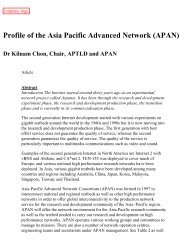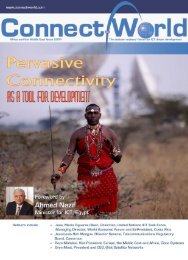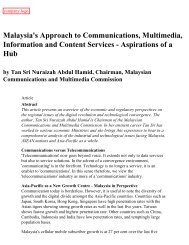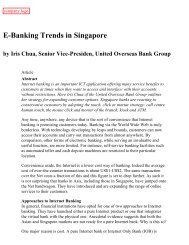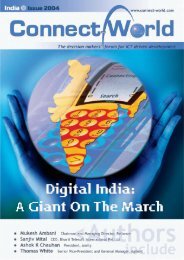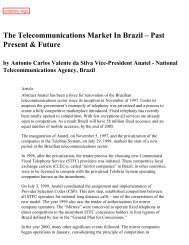Contents - Connect-World
Contents - Connect-World
Contents - Connect-World
You also want an ePaper? Increase the reach of your titles
YUMPU automatically turns print PDFs into web optimized ePapers that Google loves.
<strong>Contents</strong><br />
40<br />
46<br />
VoIP<br />
VoIP networking for economic development<br />
by Richard C. Grange, President and CEO, New Global Telecom<br />
Voice-over-Internet Protocol or VoIP is changing the worlds<br />
telecommunications. In the USA, VoIP is regulation free and<br />
growing rapidly. Skype, offering free computer-to-computer<br />
voice service, has millions of users. Operating companies routinely<br />
use IP services to carry long-distance traffic. Companies of<br />
all sizes and residences will soon be using VoIP for low-cost,<br />
affordable, communications.<br />
Wireless Internet<br />
Wireless Internet access as the key to<br />
knowledge-based growth and economic<br />
prosperity<br />
by Thomas A. Freeburg, Chief Operating Officer and Director of<br />
Strategy, MemoryLink<br />
Giving a farmer a telephone can double his income; connecting<br />
workers to the Internet provides a similar advantage. Two<br />
billion additional Internet connections are needed for Asia-<br />
Pacific to reach North American penetration levels. Wireless<br />
operating at unlicensed frequencies, with capital investments<br />
as low as US$9 per dwellingis an economical way to provide<br />
such connectivity.<br />
55<br />
58<br />
New technology, new users, new possibilities<br />
in China<br />
by Charles Henshaw, Executive Director and Chief Executive Officer,<br />
China Resources Peoples Telephone Company Limited<br />
China, the worlds largest cellular user still has low market penetration,<br />
Hong Kong has one of the highest. In both, voice<br />
drives mobile usage, but data services are proliferating. Mobile<br />
growth in Hong Kong depends upon applications and content<br />
availability. In China, growth in mobile data is limited while<br />
awaiting government regulation of 3G.<br />
Location-based systems<br />
Locating everything–electronic trackers<br />
by Chris Wade, Chief Executive Officer, Cambridge Positioning<br />
Systems Ltd.–CPS.<br />
New technology lets mobile operators accurately track users,<br />
even in crowded city centres and indoors. Device manufacturers<br />
are now integrating standardised, high accuracy, location<br />
technology into phones and other devices. The technology is<br />
used for everything from child and pet tracking, to fleet and<br />
workforce management, to locating laptops, cash boxes and<br />
other valuable assets.<br />
Billing<br />
Broadband wireless<br />
61<br />
Real-time billing makes its mark in<br />
emerging markets<br />
by Yossi Shabat, Comverse, Division Vice-President, Asia Pacific<br />
48<br />
The road to broadband wireless—An<br />
industry overview<br />
by Majed Sifri, President and CEO, Redline Communications Inc.<br />
There is great need for high performance voice, data and video<br />
communications for applications such as e-learning, e-government<br />
and surveillance. Broadband wireless can provide backhaul<br />
for mobile and fixed wireless networks and bridge widely<br />
separated local area WiFi-networks. It offers cost-effective, coverage,<br />
quality of service (QoS) and security in areas that preclude<br />
traditional broadband deployment.<br />
The Asia-Pacific region makes use of real-time billing; this<br />
reduces subscriber bad debt risk, lowers costs and assures revenues.<br />
Real-time authorisation, monitoring, tariffing, charging<br />
and account updating make prepaid systems possible.<br />
Consequently, they make possible mobile services in the developing<br />
regions of the world. Real-time billing lets emerging<br />
markets enjoy the same services available in developed markets.<br />
Mobile data<br />
53<br />
How clever mobile multimedia solutions<br />
can help operators across the telecom<br />
sphere<br />
by Olivier Graëff, co-founder and co-CEO of Swapcom<br />
Mobile operators in developing countries are attempting to<br />
popularise data services. SMS, multimedia and games play a<br />
major role in familiarising users with mobile data. Nevertheless,<br />
the complexities and costs of serving relatively unsophisticated<br />
users challenge operators. Device recognition software permits<br />
over-the-air troubleshooting, service updates, makes usage simpler<br />
for the customer, promotes usage of advanced services and<br />
reduces costs.<br />
Promotional Features<br />
CommunicAsia<br />
GSM India<br />
Telecomm India<br />
Submarine Networks<br />
IT Solutions<br />
16<br />
28<br />
37<br />
42<br />
49<br />
2<br />
All articles are available online at: www.connect-world.com



